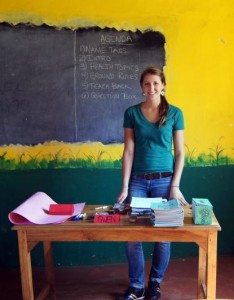Gwen Kidera, a fifth year International Affairs and Environmental Studies major, spent her final fall co-op abroad in Meru, Kenya with the Miriam Kanana Mubichi Foundation (MKMF), a non-profit focused primarily on public health and education. On the ground in Meru, Gwen had the freedom to pursue projects she was interested in, as she worked with only one other colleague at the foundation.
Gwen took full advantage of her job’s flexibility by continuing existing projects and starting new ones as well. She was so personally invested in her work that she often funded projects out of pocket, such as the Reading Stars program she implemented. Reading Stars is a promotional after-school reading program which encourages higher enrollment rates at the two libraries built by MKMF. She also offered training in computer skills and created marketing materials for Makena Textiles, the first woman-owned company in Meru and the Eastern Province of Kenya. Gwen was able to showcase her “intrapreneurial spirit” and fund her projects through a generous grant awarded by the Social Enterprise Institute. Further to her own projects, Gwen also embarked on health education programs focusing on Health/Sanitation as well as Nutrition.
Health & Sanitation:
During her time in Kenya, Gwen taught a health and sanitation course as many Kenyan public schools lack health education courses. She designed lesson plans and taught the courses at two local primary schools. Among the topics covered were hand washing, the prevention of intestinal worms, and the facts and myths of stigmatized topics like HIV/AIDs and menstruation.
As the issue of HIV/AIDS receives a lot of attention from other non-profits in Meru, Gwen helped work on some of MKMF’s programs regarding other public health issues that are often forgotten or overlooked by other nonprofits, such as sanitation. Gwen helped continue MKMF’s sanitation projects by assessing primary schools’ needs for pit latrines and classroom resurfacing projects in which cement floors are poured in dirt-floor classrooms to protect students from fleas and mites. Gwen stressed the importance of local input and support in guiding MKMF to implement projects, such as the latrine project which targeted a community needs that may have been previously overlooked.
Malnutrition:
Gwen saw firsthand that many Kenyan children whose families depend on agriculture suffer from malnutrition, especially due to recent droughts in the surrounding areas of Meru and also devastated Kenya’s neighbor, Somalia. She helped to organize MKMF’s response to preventing malnutrition through a new project that provides a bowl of fortified porridge each day to every student at a handful of schools. Gwen envisions two goals of this project– first, to prevent malnutrition and second, to encourage children to stay in school rather than leave to find work to pay for food.
In addition, MKMF has a program providing baby formula to malnourished children that are patients at Meru District Hospital, she explained. In addition to monitoring formula distribution, Gwen traveled twice a week to the hospital to interview mothers of malnourished children to identify causes or factors associated with their children’s diet and nutritional status. A compilation of her interviews illustrate aspects of the local context that are contributing to malnutrition, including the many limitations mothers face such as unemployment, inability to breastfeed due to HIV/AIDS, and lack of education. Gwen is currently working on a research paper detailing a malnourished child’s typical family profile from her consolidated interviews.
Gwen believes it is essential to understand the factors in order to effectively prevent malnutrition. “I saw that many of these projects are in an effort to increase preventative measures in the future and could have a major impact on the lives of many,” recalls Gwen.
In her last blog entry about her work in Kenya, Gwen comes to a humble conclusion. “I just hope a little piece of me lingers on in Kenya, even if the impact I made was minimal… Maybe the best gift I could have given was the beginning of a few new projects, ones which should continue and make larger, more lasting, impacts in the future. That’s what I really hope for, the snowball effect, in which an idea or a few words one day lead to real, measureable change.”



